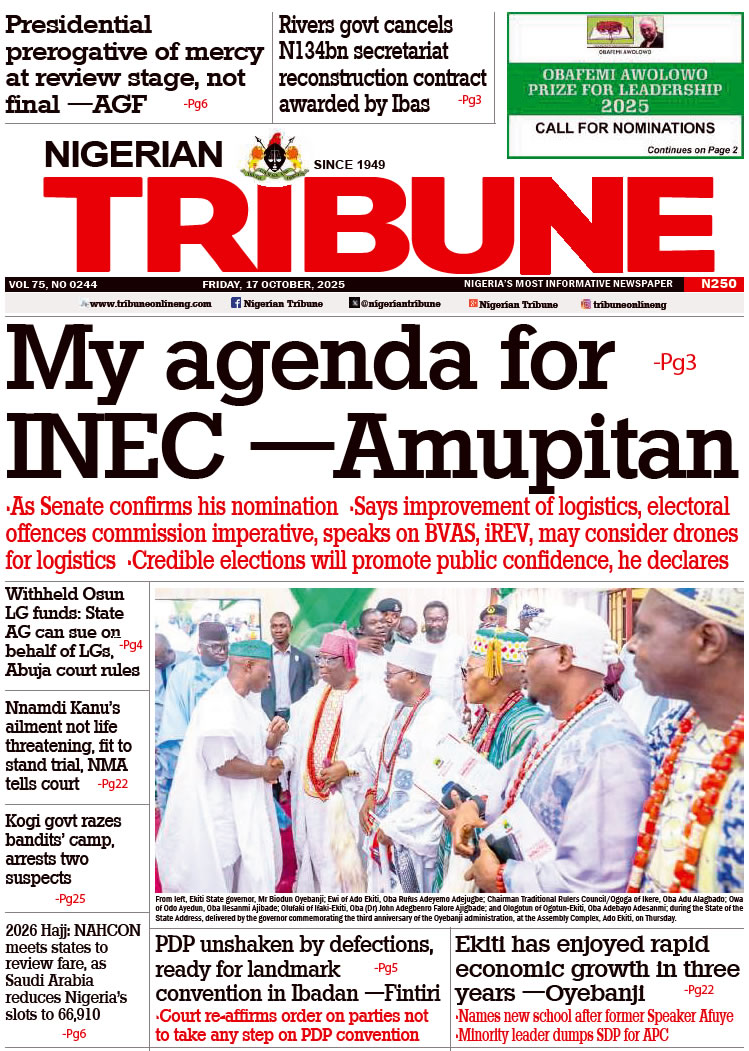Precious Ekezie is part of the new generation of African FinTech leaders shaping how payments are done on the continent. As Airvend Payment Services Limited, he has championed products like Airvend, Airpay, and Airgate, scaling them beyond local relevance into platforms with international partnerships. In this interview with BODE ADEWUMI, he speaks on issues bordering on financial technology. Excerpts:
WHY is licensing such a critical part of building user trust in the FinTech space?
Licensing is the foundation of trust in financial services. It reassures users that a company operates within a regulated framework, meeting stringent requirements around security, governance, and financial stability. For Airvend, holding a CBN licence is not just about compliance, it’s a visible commitment to transparency, responsibility, and user protection. It signals to customers and partners alike that their transactions are safeguarded under the same standards applied to the most established players in the industry.
How has your experience securing different CBN licences shaped your business strategy?
Securing licences has been transformative for our business. For example, when we obtained the Payment Solution Services (PSS) licence, a comprehensive 3-in-1 licence covering PSSP, PTSP, and Super Agent, it required us to strengthen our internal structures and governance frameworks. This shaped our strategy to focus on sustainable growth rather than short-term expansion, ensuring that we scale with resilience. It also instilled greater discipline in how we allocate capital, allowing us to meet regulatory requirements such as the minimum capital base while still pursuing innovation and market growth.
What are the key differences between operating with and without formal licences in Nigeria?
The difference is significant. With a licence, you gain direct access to PTSAs such as NIBSS, along with stronger credibility with banks, card schemes, mobile network operators, other financial institutions, and even regulators. This empowers you to scale services under your own infrastructure with greater control. Without one, you remain dependent on third parties, which limit flexibility, reduces margins, and increases operational risks. Most importantly, formal licensing provides the stability and regulatory assurance that safeguard customer trust and ensure business continuity, advantages no fintech can afford to overlook.
How do you communicate your licence status and compliance commitments to customers?
We make it a central part of our brand story. On our website and app, our CBN licence status is clearly displayed in line with the CBN circular mandating all licensed institutions to show their corporate name and the phrase “Licensed by the Central Bank of Nigeria”. Our customer support team is also trained to explain its significance in simple, relatable terms. For example, when onboarding agents, we emphasise that being CBN-licensed means we uphold strict KYC standards and ensure transaction security. What could be seen as regulatory “red tape” is reframed as a trust-building advantage that reassures customers that their transactions are safe.
Does licensing influence investor confidence and funding?
Absolutely. Licensing is a strong signal to investors that a business is operating within a regulated framework, which immediately reduces risk. Active licences and a solid compliance record demonstrate not only innovation but also governance discipline, financial stability, and long-term sustainability. For investors, this translates to confidence that the company can scale responsibly, manage regulatory changes, and protect customer trust. In many cases, holding the right licences is a prerequisite for major funding rounds, it can be the difference between unlocking investment opportunities or being overlooked.
How important is it for agents and partners to understand your licence coverage?
It’s very important. Agents represent our brand at the frontlines, while partners rely on us for secure integrations and reliable service delivery. When they clearly understand the scope of our licence, they gain confidence in the protections, credibility, and opportunities it provides. Just as importantly, ensuring that agents and partners understand the permissible activities and jurisdiction of the licence helps keep the business firmly within the regulatory framework.
Can you share how licensing impacts your relationships with mobile network operators?
Licensing plays a critical role in how we engage with mobile network operators. Our NCC licence enables direct integration with MTN, Airtel, Glo, and T2, a prerequisite for operating at this level of partnership. It builds confidence in our relationships, secures better pricing for both B2C and B2B customers, and ensures we operate on equal footing with established players. In addition, our CBN licence further strengthens opportunities for strategic collaborations with MNOs, providing a solid foundation for innovation and sustainable growth.
In what ways do you think the licensing system in Nigeria can be improved?
Nigeria’s licensing framework has created a strong foundation for trust and stability in the financial ecosystem. As the market evolves, there may be opportunities to make the system even more enabling for innovation. Globally, regulators are increasingly adopting proportional regulatory models, ranging from size-based banking oversight to sandbox environments and tiered licenses, to balance oversight with growth. A similar approach in Nigeria, such as a tiered structure where obligations scale with transaction volumes, could encourage more startups to participate at the grassroots level while maintaining oversight. In addition, further streamlining of approval timelines would help fintechs respond faster to market needs, ultimately advancing the regulator’s goal of financial inclusion and industry growth.
What are the risks of operating without proper regulatory clearance in this industry?
The risks are significant. Beyond regulatory fines or shutdowns, the greatest danger is reputational damage. Once users learn that a platform has been suspended by the CBN or is not aligned with industry regulators, rebuilding trust becomes extremely difficult. In financial services, credibility is the most valuable currency. Operating without clearance may look like a shortcut, but in reality, it leads to higher risks, limited partnerships, and ultimately, a dead end.
Do you think licensing procedures are fair to both startups and established firms?
The licensing framework has been instrumental in ensuring integrity and stability in the industry. At the same time, there may be opportunities to make it even more enabling by recognising the different stages of growth across market participants. A more proportional approach, where compliance expectations evolve as institutions expand, would encourage innovation at the grassroots level while maintaining strong regulatory oversight. This balance would support both new entrants and established firms in contributing to the growth of the ecosystem.
ALSO READ TOP STORIES FROM: NIGERIAN TRIBUNE
WATCH TOP VIDEOS FROM NIGERIAN TRIBUNE TV
- Relationship Hangout: Public vs Private Proposals – Which Truly Wins in Love?
- “No” Is a Complete Sentence: Why You Should Stop Feeling Guilty
- Relationship Hangout: Friendship Talk 2025 – How to Be a Good Friend & Big Questions on Friendship
- Police Overpower Armed Robbers in Ibadan After Fierce Struggle






